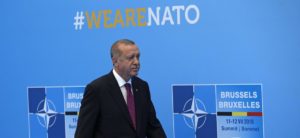It is a question that has been ever-present in the minds of Western analysts and officials since Turkey received its first shipments of Russian S-400 air defence missiles last July, and which has become increasingly urgent as the day has drawn near: What will happen when Turkey activates the systems that NATO and U.S. officials view as a threat, and could the move further erode already mangled ties between Turkey and the West?
Two days after Turkey celebrated 68 years as a NATO member, Turkish Defence Minister Hulusi Akar vowed last week that Turkey would switch on the S-400s in the next few months, once training and installation had been completed.
Turkey and Russia agreed to the S-400 deal in September 2017, despite the protests of its U.S. and NATO allies, which see the Russian system as incompatible with NATO’s security architecture and a threat to the defences of U.S.-made F-35 stealth fighters. The United States countered by offering its Patriot missile systems, which Turkey rejected.
“We know the Turkish narrative about buying S-400s: they couldn’t buy Patriots because they wouldn’t get technology transfer,” Marc Pierini, visiting scholar at Carnegie Europe and former European Union ambassador to Turkey, told Ahval in a podcast. “They claim there is technology transfer with the S-400. We know very well that this is not true.”
When Turkey began accepting S-400 components in July, the Pentagon suspended Turkey from its F-35 production process and halted the sale of 100 F-35 jets to Ankara. Under the Countering American Adversaries Through Sanctions Act (CAATSA), Turkey should also face economic sanctions for its purchase, but President Donald Trump has held off signing off on the measures. U.S. officials have vowed to levy the CAATSA sanctions if Trump fails to do so.
Turkey has NATO’s second largest military after that of the United States and anchors the alliance’s defences from the Black Sea to the eastern Mediterranean. Analysts have said the strength and unity of that front would be undermined by its S-400 deployment. Some current and former U.S. officials have gone so far as to question Turkey’s NATO membership, while Turkish pro-government news outlets have heaped scorn on the alliance.
Turkish officials have repeatedly said that Turkey sought to express its foreign policy independence by accepting the Russian offer. Now the presence of Russian systems on NATO-allied territory leaves the F-35 jets open to possible subterfuge. Pierini said that Turkey’s S-400 purchase had eroded NATO’s trust and would substantially alter the alliance’s military organisation.
“What you have is the most sophisticated anti-missile and radar system operated by Russia at the heart of the Turkish Air Force and the NATO alliance,” said Pierini. “Basically, the entire fleet of the Turkish armed forces – mostly the Turkish Air Force, but also the army and navy – is now under the gaze of the most sophisticated radar system of Russia, manned by Russians.”
He described this as a major win for Russia, which would now have technicians calibrating S-400 acquisition radars with U.S.-made F-16s and other fighter jets. This represented a major problem, not just for the United States, but also for NATO, which Pierini said faced several urgent questions.
Should NATO continue to deploy its Boeing-made Airborne Warning & Control System (AWACS) surveillance aircraft over Turkey? Should NATO keep its advanced early warning radar systems at Kürecik station in southeast Turkey, a key node of NATO’s European missile defences?
“Do we have full trust in the Turkish elements of NATO’s sensitive operations over the Black Sea or elsewhere?” Pierini said, adding that these questions remained unanswered. “NATO officials won’t talk publicly about it. There’s a very strong process of rethinking all this stuff to see how to manage it.”
Already, Turkish officials are being frozen out of crucial NATO military meetings and committees over increasing concerns about information security. Meanwhile, Turkey has begun reaching out to the United States and NATO as relations with Russia have deteriorated as a result of the tensions in Syria’s Idlib province.
Last week, Akar reiterated Turkey’s request that the United States support Turkey’s military positions in Idlib by deploying Patriot batteries on its border. “We still need additional air defence systems, our Patriot negotiations continue,” the defence minister said.
Pierini viewed Turkey’s S-400 purchase as part of a more independent foreign policy approach that dovetailed with Turkey’s shift toward autocracy. This had made Turkey more assertive toward Europe and the West, willing to, for instance, send ships to drill for natural gas in waters claimed by Cyprus and sign a much-criticised maritime borders deal with the Libyan Tripoli government.
“This is part of a strategy I call permanent disruption, where you see the Turkish leadership essentially for domestic purposes, kicking and screaming and inventing new moves on a regular basis,” said Pierini, adding that Turkey’s accession to the European Union is no longer even discussed as a possibility. “What is at issue is how much the EU and NATO can accept and remain idle in front of all this disruption.”
© Ahval English
The views expressed in this column are the author’s and do not necessarily reflect those of Ahval.





